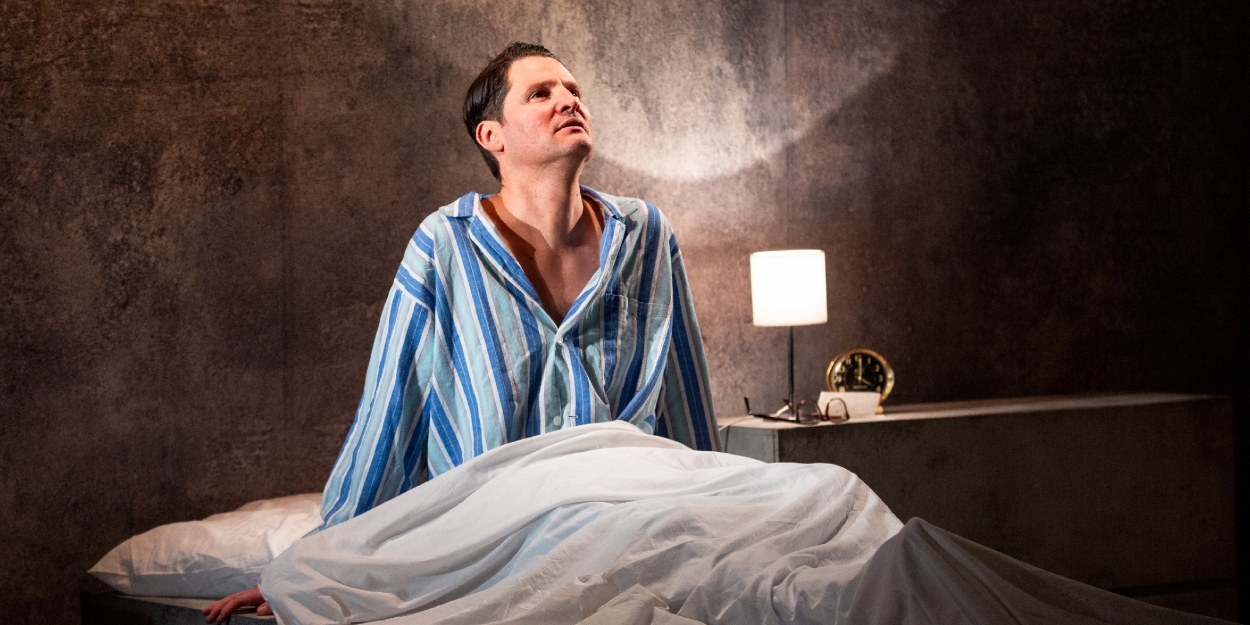Review: A SINGLE MAN, Park Theatre
Simon Reade's adaptation of Isherwood's classic premieres with a performance that’s so rooted in the film they should add “after Colin Firth” in the program.

![]() Back in 2009, fashion designer Tom Ford debuted his very first film, an adaptation of the 1964 novel A Single Man by Christopher Isherwood. At that point and since its publication, the book had been as praised for its style as it had been condemned for its subject matter. Isherwood follows a day in the life of a middle-aged man named George months after his partner Jim suddenly died in a car crash across the country. It's an exquisite reflection on age, grief, loneliness, and queerness.
Back in 2009, fashion designer Tom Ford debuted his very first film, an adaptation of the 1964 novel A Single Man by Christopher Isherwood. At that point and since its publication, the book had been as praised for its style as it had been condemned for its subject matter. Isherwood follows a day in the life of a middle-aged man named George months after his partner Jim suddenly died in a car crash across the country. It's an exquisite reflection on age, grief, loneliness, and queerness.
The movie kick-started Ford's career and gathered universal acclaim from Venice to the Academy. Colin Firth is unforgettable in the role. That's what anchors director Philip Wilson's production. Written by Simon Reade, this brand new stage adaptation of Isherwood's masterpiece is weighed down by a performance that's so rooted in the film they should add "after Colin Firth" in the programme.
Theo Fraser Steele is all pretentious sighs and curated received pronunciation. His accent, tone, delivery, and even mannerism are the carbon copy of Firth's - even if one only vaguely knows Firth. It's a perfect casting, if that was the aim. He even bears quite a Firthian strong chin. Fraser Steele is sardonic and unfazed by the daily proceedings of his character, which are severed by some unconvincing outbreaks of emotions. In all this, unfortunately, he lacks chemistry with each of the satellite characters that orbit around George.
Olivia Darnley is his best friend, here a ditzy presence who holds very little weight. Their big dinner scene is a slog as they compare notes on their miserable condition and dream of buying the English pub Jim loved. Then there's Kenny, impressively crafted by Miles Molan, for whom A Single Man marks his professional debut. A head-cocking, confident student, he briefly shakes George's life up.
This Kenny is closer to Isherwood's original, as is Reade's attention to the storyline. Reade writes a tender look at a man who's become an observer only, a precise commentator of what goes on around him. He gives George an exceptionally poetic private outlook that's been bruised and mangled by death and disappointment. As George's inner monologue leads the play, the audience's perception of the events is the same as his own understanding of them. This results in all characters sounding the same.
There's no difference between the overly lyrical dialogues and George's morose indentations where he reflects on his situation. The text is efficiently riddled with dark humour and sarcasm that amuse an otherwise dull and slow show. A stark lack of traction permeates the piece, spread by the absence of tension in the script itself.
There's an attempt to replicate the urgency Ford added so cleverly in his film, but book-ending the play with a pair of paramedics who comment on George's state and direct his actions isn't enough to be gripping. By the time George resolves to keep living, at the end of his day, having chatted with Charley and swum with Kenny, we find he's never expressed anything other than that.
Caitlin Abbott's set is a brutalist dream. A rectangular parallelepiped of concrete doubles as a bed and a table, constantly looking sepulchral. Mid-century accents briefly appear. It's inhospitable and cold and miserably uncomfortable, a visual allegory for the man himself. Wilson toys with the limitations of the theatrical medium, opting for a romantic direction with exposed scene changes and transitions choreographed with dexterity.
Unfortunately, it all ends up looking like a fake play seen in a movie where the characters go to the theatre to advance the plot or reflect on life. "I cling only to now" George says at the end, but this iteration clings too much to the established reputation of the material to offer anything original.
A Single Man runs at Park Theatre until 26 November.
Photo Credit: Mitzi de Margary
Reader Reviews

Videos
